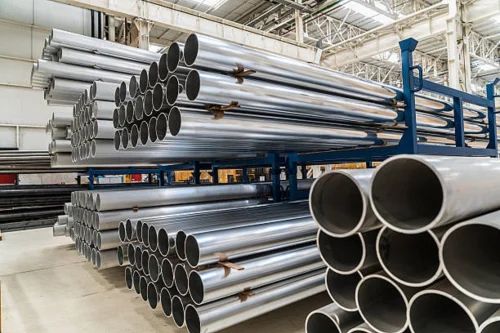Stainless steel pipes have become an indispensable component in modern industrial infrastructure due to their durability, corrosion resistance, and versatility. Whether used in construction, chemical processing, or water treatment plants, SS pipe solutions provide unmatched performance and reliability. These pipes can handle extreme pressure, temperature variations, and chemical exposure, making them the first choice for many critical operations across industries.
From food processing units to oil refineries, the role of stainless steel pipes in facilitating smooth and efficient operations cannot be overstated. In this article, we’ll dive into the most significant industrial applications of stainless steel pipes and explore why they are preferred over other materials.
1. Oil and Gas Industry:
The oil and gas industry demands materials that can withstand high pressure, extreme temperatures, and corrosive environments. Stainless steel pipes meet these needs exceptionally well.
- Corrosion resistance is crucial in this sector, especially during offshore drilling where equipment is exposed to saltwater.
- These pipes are used in transporting crude oil, natural gas, and petroleum products across long distances.
- Stainless steel’s strength ensures leak-proof performance, reducing the risk of accidents and environmental hazards.
Additionally, welded and seamless SS pipes are used for piping systems in refineries, petrochemical plants, and storage terminals.
2. Chemical and Petrochemical Industry:
One of the most demanding environments for industrial materials is within chemical manufacturing plants.
- Stainless steel pipes are resistant to aggressive chemicals and acidic environments.
- They maintain structural integrity even when transporting highly reactive substances such as sulfuric acid, ammonia, and chlorine.
- Their non-reactive nature ensures product purity and reduces contamination risks.
Their ease of cleaning and low maintenance also make them a top choice for these facilities, where cleanliness is a priority.
3. Construction and Architecture:
Stainless steel pipes are frequently used in architectural structures, commercial buildings, and public infrastructure.
- Their aesthetic appeal and sleek finish make them popular in exposed structural designs and decorative railings.
- High strength-to-weight ratio and weather resistance make them ideal for roofing support systems and structural columns.
- They are also employed in underground piping systems for water drainage and plumbing.
In construction, reliability is non-negotiable — and that’s exactly what SS pipes offer: consistent performance over decades.
4. Food and Beverage Industry:
Hygiene, cleanliness, and safety are vital in food and beverage production. Stainless steel pipes are preferred due to their non-toxic properties and resistance to bacteria growth.
- Used extensively in dairy processing, breweries, and beverage plants for transporting liquids.
- Easy to sterilize, reducing the risk of contamination.
- Resistant to rust, ensuring that no metallic taste is imparted to consumable products.
Their seamless construction ensures a smooth inner surface, allowing liquids to flow without obstruction and making cleaning more effective.
5. Water Treatment and Plumbing:
Water treatment facilities rely heavily on stainless steel piping for long-term efficiency.
- Resistant to chlorine corrosion, common in water treatment plants.
- Stainless steel remains unaffected by prolonged contact with moisture and chemicals.
- It’s widely used in both municipal and industrial water filtration systems.
Its use in plumbing also extends to residential and commercial buildings, where stainless steel pipes ensure clean and uncontaminated water supply.
6. Power Generation Plants:
In power plants, high temperatures and pressurized steam are part of everyday operations.
- SS pipes are employed in boiler systems, steam lines, and cooling systems.
- Their ability to withstand thermal stress ensures minimal maintenance and extended service life.
- Stainless steel is also used in nuclear power plants where material integrity is a matter of safety.
Their adaptability and toughness make them crucial in sustaining uninterrupted power supply across grids.
7. Automotive and Aerospace Industries:
In high-performance industries like automotive and aerospace, every component must meet strict quality and performance standards.
- Stainless steel pipes are used in fuel lines, exhaust systems, and hydraulic lines.
- Their lightweight yet sturdy structure helps improve fuel efficiency and system durability.
- Resistance to vibration and mechanical stress is vital in these sectors.
Their corrosion-resistant nature also ensures long-term reliability under extreme conditions — both on land and in the sky.
8. Pharmaceutical Industry:
The pharmaceutical sector requires absolute purity and cleanliness during the production of medicines and chemicals.
- Stainless steel pipes are used in cleanroom environments to transfer purified water and active ingredients.
- Easy to sanitize, they comply with FDA and GMP standards.
- Seamless construction prevents buildup of residues, safeguarding the final product’s integrity.
These pipes are often electropolished to ensure the highest level of hygiene and surface smoothness.
9. Marine and Shipbuilding Industry:
Seawater is highly corrosive, which poses a serious threat to traditional materials. Stainless steel is a trusted material in the marine industry due to its resistance to saltwater.
- SS pipes are used in ship plumbing, ballast systems, and fuel supply lines.
- Their ability to handle high pressure and salinity makes them essential for offshore platforms and ships.
- Long service life in marine environments reduces downtime and maintenance costs.
This is one of the reasons hnyasco.com and other top manufacturers recommend stainless steel for coastal or ocean-bound projects.
Conclusion:
From carrying hazardous chemicals to delivering drinking water, stainless steel pipes serve in some of the most mission-critical applications across industries. Their corrosion resistance, durability, and hygienic properties make them the go-to choice for engineers and manufacturers worldwide.
Whether you’re dealing with oil rigs, water filtration, or precision medicine production, stainless steel ensures strength, reliability, and long-term value. As technology and industrial demands evolve, so too will the innovation surrounding SS pipes — proving their place in the future of industrial development.
If you’re looking to understand the technical properties or explore more about the varieties of SS pipe, trusted platforms like hnyasco.com provide deep insights and high-quality industrial solutions tailored to your needs.












